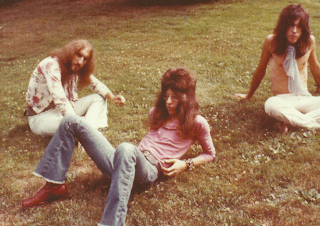Woof, welcome to the longest post on this here blog. Perhaps inspired by the fabulous work on Faded Love, a country-rock box set over on C90 Lounge, I decided to give the whole liner notes thing a try, not realizing how many words this will eventually add up to. But hey, you wanna do things right, you're gonna do things right, right?!
So, Country Dreamers. A collection of country songs by artists who normally aren't associated with country music. Putting this together was long on my mind and here's the result. These tracks are, in many ways, one-offs, that wouldn't get their due in the miscellanous places they are scattered. But hopefully, in this collection, they do. And now, without futher ado, the songs:
Paul McCartney & Wings - "Country Dreamer"
The track that gave me the idea and title for this compilation. A b-side from the Band On The Run era, it is a total charmer, despite or because of its unassuming nature. It's a true group work: Linda wrote it. lead vocals are split between Paul and Denny. "I want to roll down a hill with you, would you like to do it too?" asks Sir Paul, with childlike innocence. Yes, yes I would.
Dust - "How Many Horses"
Urban cowboys! Dust was a New York-based power trio, one of many who sprang up in the wake of Cream, and included future Marky Ramone Marc Bell. Their trade was heavy metal, and they were rumored to be the hardest and fastest band in and around the big apple at the time. Their second and best album Hard Attack, ironically a much 'softer' attack than its self-titled predecessor expanded their scope and sound and included a couple of country sojourns, of which "How Many Horses" is featured here. Great slide guitar work.
Urban cowboy country dreamers (?!)Aerosmith - "Once Is Enough"
Another harder rocking group trying their hand on country, no doubt urged on by secret country fan Steven Tyler. They of course did it a couple of years later to huge success with "Crazy" and "Crying", but this track from a rare-ish (because only issued in Japan) EP in 1988 did it first. The original has a second section that replays the song in Aerosmith's typical boogie rock style, so I only kept the true 'country version' of the song.
Counting Crows - "Amie"
Before issuing their covers album Underwater Sunshine, Counting Crows were known as a rootsy band, but no one considered them particularly interested in country music, or classic country rock. It was thus slightly surprising to see them cover two stone-cold country classics, of which Pure Prairie League's immortal "Amie" is featured here.
The Beach Boys - "Cottonfields"
The Boys were unhappy with Brian's production on the song on Wild Honey, with lead vocalist Al Jardine especially unhappy about what he felt was an unfinished recording, so they recut a new version a year later, augmented by steel guitar from the legendary Red Rhodes. Jardine was right, as while this more countryfied version of the traditional (their last Capitol single) stiffed in the U.S., it was their biggest hit internationally in years, hitting number one in Australia, Norway and Sweden and barely missing the top in several other countries.
Well, at least one of them is wearing a cowboy hat...Jon Bon Jovi - "Blood Money"
Mr. Bon Jovi issued a whole album full of songs about cowboys (Blaze of Glory, "inspired" by the movie Young Guns II, with the title song becoming a number one hit), but with one exception none of the songs sounded country in any way. That exception is "Blood Money", also the only song that is decidedly about Billy The Kid and Pat Garrett, whereas the other songs trade in more general and stereotypical outlaw and Western imagery. A lovely country ballad, it wasn't what anyone expected from Bon Jovi at the time, which might explain the truly odd editing job, with the song fading out in the middle of the (first!) chorus. I suspect the song was much longer than the mere two-and-a-half-minute glimpse we get here, but was somewhat brutally hobbled because it wasn't what the demographic was looking for. Even at half a song, it's a great half of a song!
Van Morrison - "I Wanna Roo You (Scottish Derivative)"
A country waltz, as in a true waltz (the wife and I taught a couple how to waltz for their wedding to this). Morrison, like Counting Crows, was always a rootsy artist, but until his pure country & western genre exercise Pay The Devil in 2006 hadn't recorded a full-fledged country album. Pay The Devil is pure pastiche, but the one truly great roots-and-almost-country album in his discography is Tupelo Honey. Pedal steel runs through the majority of the tracks, until recently I hadn't realized that even the r'n'b-inspired "Wild Night" has some of it. The album's themes and imagery are rural, reflecting Van's country retreat to Woodstock with wife Janet Planet and their infant son. Van's country dream wouldn't last, but for one fantastic album, it was glorious.
Candi Staton - "Jolene"
Coming at the tail end of her tenure at Fame, where the queen of Southern soul did her best work, this Dolly Parton cover was left in the can and thus without the customary orchestration, making the track better by substraction. Riding an atmospheric, almost eerie loping rhythm, the relatively bare bones production underscores Staton's pleas not to take her man perfectly.
Metallica - "Mama Said"
Heavy metal dudes going country, a theme for this compilation, this comes from the uneasy post-'black album' period where Metallica were not sure how to follow up their bestseller, then tried a bit of everything for the follow up Load, including this country ballad, which is one of the better results of their experimentation.
Blackfoot - "Rainbow"
And yet another group of hard rockers going country, though in fairness by this time Blackfoot were only Ricky Medlocke and whatever backing musicians he had, though interestingly the guitar player on this is the recently featured late, great Neal Casal. Medlocke's road tale is augmented by some tasty pedal steel. He also covered "Tupelo Honey" on the same album, so maybe Morrison's rootsy classic was on his mind when he cut this.
The Hollies - "Boulder To Birmingham"
Some words on the Hollies and Americana have been said very recently on this blog, though by the time they cut this cover of Emmylou Harris' harrowing eulogy for fallen partner Gram Parsons, Mikael Rickfors was long gone and Allen Clarke back in the fold. The instrumentation isn't particularly country, and they don't come anywhere near Harris' intensity, but the lovely harmonies make this a kind of country gospel.
Marc Cohn with Aimee Mann - "No Matter What"
Marc Cohn's cover album Listening Booth: 1970 was a very hit-and-miss affair, with more misses than hits on what came off as a bit of well-meaning karoke. But he didn't miss on this cover of Badfinger, turning it into a relaxed country shuffle and getting Aimee Mann for extremely overqualified support work.
Nick Cave & The Bad Seeds - "City Of Refuge" (acoustic version)
The original version on Tender Prey is a sort of deranged psychobilly affair, but this acoustic version, released on an obscure bonus single, shows it to be a country ballad at heart, with the Bad Seeds providing unusually subtle back-up here with their decidedly 1960s-sounding choir vocals. In this state, you can easily mistake this for an old Marty Robbins number. Or maybe not, but you catch my drift.
England Dan & John Ford Coley - "Showboat Gambler"
I hesitated to include this, because this dastardly duo was much closer to country than the other artists here, but their main trade was in a folksy soft rock idiom, a little bit later in the decade with (of course!) some disco influences. "Showboat Gambler" is one of the lesser known numbers, though popular enough to be included in their Very Best Of collection.
Mick Ronson - "Woman"
And we ride into the sunset with a second Pure Prairie League cover, by the man who helped Craig Fuller and George Ed Powell to put the classic Bustin' Out together, after the first PPL line-up imploded. Here, Ronson covers a song the band themselves covered on their debut album, and it's interesting to hear Ronson's take on it, Brit accent and all.
And now, really without further ado, the album. Enjoy.

.jpg)


































